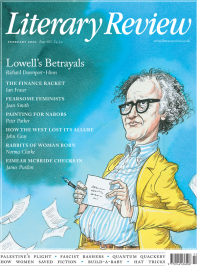Simon Heffer
Stony Expressionists
The Mother of Beauty: On the Golden Age of English Church Monuments, and Other Matters of Life and Death
By Nigel Andrew
Thorntree Press 244pp £10
This is an odd book. Nigel Andrew is not, unlike most of those who have written works on English church monuments, an art historian or architectural scholar; he is a retired journalist with a special interest in the subject who has both read widely on it and visited a number of the finer parish churches around the country. That might cause one to expect a book about pottering from one chancel to another while sharing random impressions of the antiquities inspected, and to an extent that is what one gets. But one also gets assorted meditations on death and bereavement and their place in our culture, now and in the past. As such, Andrew’s book is one that defies categorisation and says far more about his own preoccupations than it does about its notional subjects.
He has well-formed ideas about the merits of funerary monuments. For him there was a golden age and it covers much of the 17th century. What attracts him to this era is the ‘quite extraordinary’ work of the monumental masons active at the time. There was no more of the ‘stiff and stylised monumental art’ of the Tudors, who presented the subjects of their memorials ‘less as individuals than as social types’. In the early 17th century, Andrew says, the memorialised began to ‘become fully corporeal individuals, naturalistically represented, in movement and at rest, embodied in their own space’. Of course, all good things must come to an end. As the 17th century moved towards, and passed into, the 18th, the monuments became more ostentatious, demanding an audience.
Andrew attributes the improvement in funerary art to the arrival in England of masons and sculptors from Europe, mainly from the Netherlands. Some came as refugees – the Holy Roman Emperor Charles V, who governed the Netherlands at the time, was told by Pope Paul III in 1547 to stop

Sign Up to our newsletter
Receive free articles, highlights from the archive, news, details of prizes, and much more.@Lit_Review
Follow Literary Review on Twitter
Twitter Feed
Alfred, Lord Tennyson is practically a byword for old-fashioned Victorian grandeur, rarely pictured without a cravat and a serious beard.
Seamus Perry tries to picture him as a younger man.
Seamus Perry - Before the Beard
Seamus Perry: Before the Beard - The Boundless Deep: Young Tennyson, Science, and the Crisis of Belief by Richard Holmes
literaryreview.co.uk
Novelist Muriel Spark had a tongue that could produce both sugar and poison. It’s no surprise, then, that her letters make for a brilliant read.
@claire_harman considers some of the most entertaining.
Claire Harman - Fighting Words
Claire Harman: Fighting Words - The Letters of Muriel Spark, Volume 1: 1944-1963 by Dan Gunn
literaryreview.co.uk
Of all the articles I’ve published in recent years, this is *by far* my favourite.
✍️ On childhood, memory, and the sea - for @Lit_Review :
https://literaryreview.co.uk/flotsam-and-jetsam